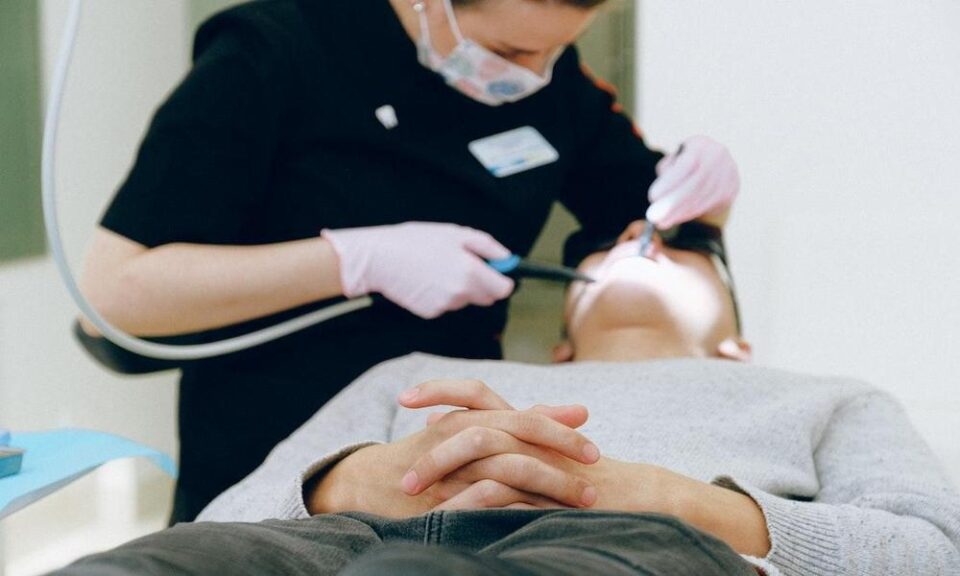Gum health is very important for good dental health and it is also important for your systemic health and wellbeing. It is important that you maintain good dental hygiene and strong gums to prevent dental complications, but also to maintain good health overall. Poor oral hygiene and avoiding the dentist can result in gum disease. Gum disease is when the gums become inflamed as a result of toxins released by bacteria in the mouth and this results in a range of unpleasant symptoms. You will notice bleeding when you brush or floss between your teeth. Gum disease can cause swollen gums, soreness and bad breath. If left untreated then gum disease can result in gum recession and bone loss. The bone around your teeth which holds your teeth in place can weaken and degrade resulting in wobbly teeth. Soon this results in tooth loss. Gum disease is the most common cause of premature tooth loss.
Scale and polish with the hygienist
To prevent gum disease and tooth loss you need to visit the dentist and hygienist Richmond on a regular basis.The dentist and hygienist can detect gum disease at its early stages and teach you good dental hygiene to help you restore the health of your gums. The hygienist will carry out a professional scale and polish that will remove plaque and tartar from the surface of your teeth. As mentioned bacteria that live on the plaque and tartar release toxins which damage the gums. As the gums become inflamed and swollen they move away from the teeth and bacteria is able to creep underneath the gum line. This results in worsening of the symptoms. Your hygienist will remove plaque and tartar from the surface of your teeth and from underneath the gum line and if this is done on a regular basis, in combination with good dental hygiene at home, you should be able to maintain healthy teeth and gums for the rest of your life.
Most dentists recommend that you undergo a scale and polish once every six months, depending on the health of your teeth and gums. If you suffer from gum disease then you may need to visit the hygienist every three to four months. If you avoid the dentist and hygienist for long periods of time then plaque and tartar continue to build up on your teeth, the bacteria continue to damage your gums and as mentioned this results in wobbly teeth and tooth loss.
Root planing with the hygienist
Advanced stages of gum disease can also be treated by your dentist and hygienist. It can be reversed by deep cleaning also known as root planing. Root planing is similar to a scale and polish, however, it is carried out on the roots of your teeth that are below the gum line. Your hygienist will move the gum aside and expose the surface of the roots to remove the bacteria, plaque and tartar from deep within the root area. They will then smooth the roots using a scaling tool which will help the gum to reattach to your teeth. This can take one to four hours. You may need more than one appointment depending on your individual circumstances. The process itself is carried out under local anaesthetic to reduce any pain and discomfort. Nervous patients can also find out about sedative techniques for greater comfort and ease. After the procedure is complete you may be given antibiotics to help treat any lingering infection. You may feel slight discomfort for the first few days, but soon your gums will reattach to your teeth and any discomfort or sensitivity should subside. If you have suffered from extensive gum loss or gum recession then you may require surgery.
By visiting the dentist and hygienist on a regular basis you can help maintain healthy gums, strong teeth, fresh breath and a beautiful looking smile as gum disease and gum recession can also affect the appearance of your teeth. You will prevent premature tooth loss and the many complications that tooth loss can have on your health and wellbeing. Tooth loss can affect the quality of your life, therefore you need to take excellent care of your teeth. Your gums hold your teeth in place so they need to be looked after. You need to maintain excellent dental hygiene, brush your teeth at least twice a day, floss at least once, enjoy a healthy diet and a healthy lifestyle and make sure that any abnormalities or differences in your teeth or gums are reported to your dentist immediately.

